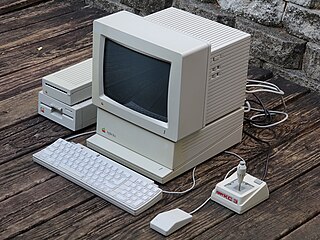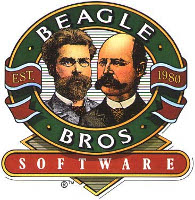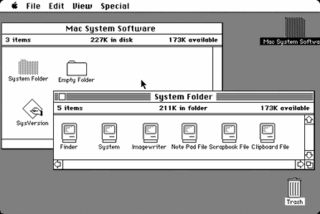Related Research Articles
HyperCard is a software application and development kit for Apple Macintosh and Apple IIGS computers. It is among the first successful hypermedia systems predating the World Wide Web.
Interactive fiction (IF) is software simulating environments in which players use text commands to control characters and influence the environment. Works in this form can be understood as literary narratives, either in the form of Interactive narratives or Interactive narrations. These works can also be understood as a form of video game, either in the form of an adventure game or role-playing game. In common usage, the term refers to text adventures, a type of adventure game where the entire interface can be "text-only", however, graphical text adventure games, where the text is accompanied by graphics still fall under the text adventure category if the main way to interact with the game is by typing text. Some users of the term distinguish between interactive fiction, known as "Puzzle-free", that focuses on narrative, and "text adventures" that focus on puzzles.

A/UX is a Unix-based operating system from Apple Computer for Macintosh computers, integrated with System 7's graphical interface and application compatibility. It is Apple's first official Unix-based operating system, launched in 1988 and discontinued in 1995 with version 3.1.1. A/UX requires select 68k-based Macintosh models with an FPU and a paged memory management unit (PMMU), including the Macintosh II, SE/30, Quadra, and Centris series.

The Apple IIGS is a 16-bit personal computer produced by Apple Computer. It is the fifth and most powerful of the Apple II family. It is compatible with earlier Apple II models, but has a Macintosh look and feel, and resolution and color similar to the Amiga and Atari ST. The "GS" in the name stands for "Graphics and Sound", referring to its enhanced multimedia hardware, especially its state-of-the-art audio.
A desk accessory (DA) or desklet in computing is a small transient or auxiliary application that can be run concurrently in a desktop environment with any other application on the system. Early examples, such as Sidekick and Macintosh desk accessories, used special programming models to provide a small degree of multitasking on systems that initially did not have any other multitasking ability.
MultiFinder is an extension for the Apple Macintosh's classic Mac OS, introduced on August 11, 1987 and included with System Software 5. It adds cooperative multitasking of several applications at once – a great improvement over the previous Macintosh systems, which can only run one application at a time. With the advent of System 7, MultiFinder became a standard integrated part of the operating system and remained so until the introduction of Mac OS X.

System 6 is the sixth major release of the classic Mac OS operating system for Macintosh computers, made by Apple Computer. It was released in 1988. It is a monolithic operating system, with cooperative multitasking based on an improved MultiFinder. The boxed version cost US$49, and it was included with all new Macintosh computers until 1991, when it was succeeded by System 7.

Connectix Corporation was a software and hardware company that released innovative products that were either made obsolete as Apple Computer incorporated the ideas into system software, or were sold to other companies once they became popular. It was formed in October 1988 by Jon Garber; the dominant board members and co-founders were Garber, Bonnie Fought, and close friend Roy McDonald. McDonald was still Chief Executive Officer and president when Connectix finally closed in August 2003.

Eamon, sometimes known as The Wonderful World of Eamon, is a game creation system and a role-playing adventure game series created by Donald Brown and released for the Apple II in 1980. The game is a text adventure similar to other early titles like Adventure (1976) or Zork (1980) and to later text-based multi-user dungeons (MUDs), though with many role-playing elements not available in other interactive fiction. Eamon software is non-commercial and is freely available in the public domain.
Peter Norton Computing, Inc., was a software company founded by Peter Norton. The first and best known software package it produced was Norton Utilities. Another successful software package was Norton Commander, especially the DOS version. The company in this form lasted from its founding in 1982 until 1990, when it was acquired by Symantec.

Beagle Bros was an American software company that specialized in creating personal computing products. Their primary focus was on the Apple II family of computers. Although they ceased business in 1991, owner Mark Simonsen permitted the Beagle Bros name and logo to be included on the 30th anniversary reboot of I. O. Silver, released on December 12, 2014, by former Beagle programmer Randy Brandt.

Casady & Greene was a software publisher and developer active from 1988 to 2003. The company primarily released software for Macintosh, but also released software for Windows and Newton. Casady & Greene was formed in 1988 when Greene, Inc. acquired CasadyWare, a company owned by Robin Casady.

Softalk was an American magazine of the early 1980s that focused on the Apple II computer. Published from September 1980 through August 1984, it featured articles about hardware and software associated with the Apple II platform and the people and companies who made them. The name was originally used on a newsletter of Apple Software pioneer company, Softape, who in 1980 changed its name to Artsci Inc.
Mac gaming refers to the use of video games on Macintosh personal computers. In the 1990s, Apple computers did not attract the same level of video game development as Microsoft Windows computers due to the high popularity of Windows and, for 3D gaming, Microsoft's DirectX technology. In recent years, the introduction of Mac OS X and support for Intel processors has eased the porting of many games, including 3D games through use of OpenGL, and more recently, Apple's own Metal API API. Virtualization technology and the Boot Camp dual-boot utility also permit the use of Windows and its games on Macintosh computers. Today, a growing number of popular games run natively on macOS, though as of early 2019, a majority still require the use of Microsoft Windows.
Central Point Software, Inc. was a leading software utilities maker for the PC market, supplying utilities software for the MS-DOS and Microsoft Windows markets. It also produced Apple II copy programs. Through a series of mergers, the company was acquired by Symantec in 1994.

SwordThrust is an interactive text adventure game for the Apple II, created by Donald Brown and published by CE Software in 1981. It consists of seven separate adventures and is the commercial successor to Brown's Eamon (1980).

The Macintosh "System 1" is the first major release of the classic Mac OS operating system. It was developed for the Motorola 68000 microprocessor. System 1 was released on January 24, 1984, along with the Macintosh 128K, the first in the Macintosh family of personal computers. It received one update, "System 1.1" on December 29, 1984, before being succeeded by System 2.

TeleType Co., Inc. is a privately held company in the United States that develops software for GPS devices. It was founded in 1981, under the name TeleTypesetting Company and it is based in Boston, Massachusetts. The company's product line includes automotive and commercial GPS navigation systems and other products including GPS receivers and tracking units. It develops and sells the WorldNav software for PC and Windows CE, tools for converting third-party maps into WorldNav maps, an SDK, and an API that allows the customization of the WorldNav application. TeleType Co. also offers consultancy services for those interested in acquiring and adapting the source code of their software products.

Mac OS is the series of operating systems developed for the Macintosh family of personal computers by Apple Computer, Inc. from 1984 to 2001, starting with System 1 and ending with Mac OS 9. The Macintosh operating system is credited with having popularized the graphical user interface concept. It was included with every Macintosh that was sold during the era in which it was developed, and many updates to the system software were done in conjunction with the introduction of new Macintosh systems.
References
- ↑ Plamondon, Robert: An adventure game for the Apple II with (almost) everything: Eamon, Creative Computing, Vol. 9, No. 1, January 1983.
- 1 2 LeVitus, Bob (1990). Stupid Mac Tricks . Addison-Wesley. p. 63. ISBN 0-201-57046-7.
- ↑ Scott, Greg (5 September 1988). "Scores Virus Alert". U-M Computing News. Vol. 3, no. 15. The University of Michigan Computing Center. pp. 18–19.
- ↑ Spymac to Introduce Wheel Online Service to France Market [ permanent dead link ], IT Management News, 24 August 2004.